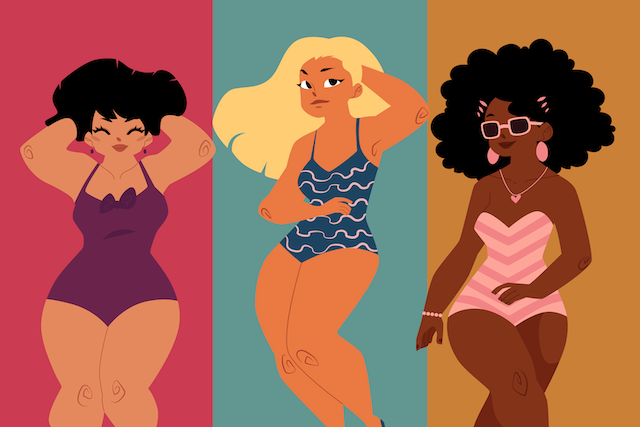
“When you’re comfortable in your skin, you look beautiful, regardless of any flaws.” ~Emily Deschanel
I started doubting the way I looked at the age of eight following comments from other children, about my twin sister being cuter/prettier than me. During adolescence I suffered from bullying because of my appearance and thought I was ugly. Like many others, I believed for many years that everything would’ve been easier if I was better-looking.
At eighteen, when I left home for military service (mandatory in Israel), I started to get positive feedback from men and to feel much better about the way I looked. But still, for many years after there was a big gap between my self-perception and how others saw me.
Today, at fifty-one, even though I’m far from perfect-looking, I have finally come to terms with my appearance.
In my work, I encounter many women, some traditionally beautiful, others with a pleasant appearance and charm, who feel that due to the way they look, there’s no chance that somebody would want them. And I know children and teenagers who think that something is wrong with them and who feel ashamed of themselves because they don’t look like models.
Accepting how we look really comes down to developing self-esteem and self-love. Nonetheless, today I want to present to you ten steps that can create a shift in your relationship with your appearance and your body.
1. Clean your social media feeds of anything that makes you feel bad about yourself and your body.
Every time you scroll through social media and come across images or ideas that make you feel bad about your life or the way you look, stop following that person or page.
You may tell yourself that certain content motivates you to change, but you can’t effectively create change from a place of self-condemnation, jealousy, or fear. So if you choose to follow someone, make sure their content genuinely inspires you and helps you feel better about yourself, not worse.
2. Don’t try to force yourself to love a body part you don’t like.
I know I might be breaking a myth here, but you don’t need to love each and every part of your body in order to love yourself.
Trying to force yourself into loving a body part that troubles you might do more harm than good, as it consumes vital energy and evokes harmful self-judgment if you fail.
If you don’t like the look of a particular part, you can still focus on its good qualities, like its strength, function, or the pleasure it can give you.
For example, the breasts you judge as too small might produce all the milk needed for your baby. And those legs that seem too big to you might enable you to hike and enjoy nature.
3. Think of people you love and appreciate who do not have a perfect look.
I know it’s hard to stop believing that attractiveness is the key to happiness. That’s why I don’t expect that this step and the following one will radically change your self-perception. Nevertheless, I think it’s important to use them as a reality check from time to time.
Start by creating a list of at least five people you love, appreciate, or look up to, who do not have a perfect look, yet you still find beautiful, charming, or attractive.
Now think of what makes these people attractive to you.
I bet that what you most like about them is their heart and personality, something we often forget to take into account when we are so absorbed in our shortcomings.
I remember that my mother used to look at me with admiration and say how beautiful I was. But since I didn’t think I was beautiful, it used to annoy me.
Now that my beloved nephew is a teenager, I find myself looking at him in this way. While he inspects his looks with critical eyes and mostly finds faults, I see a handsome young man with the biggest heart I ever saw, exceptional wisdom, and a unique personality, and he takes my breath away.
4. Think of people who don’t look perfect, who are in happy relationships.
If you insist that a worthy person would want you “if only…” (you had bigger breasts, blonde hair, or you weighed three pounds less or were four inches taller), think of people you know who are in happy relationships with great people, despite not having what you would consider perfect looks.
Create a list of five or more such people to remind yourself that someone out there would find you perfect just as you are.
Recognizing that you don’t need to look perfect to be lovable can help you accept yourself and stop wasting energy obsessing over your appearance.
5. Nourish your body with things that are good for it and things you find satisfying.
On the journey to loving ourselves and our bodies, people often suggest we nourish our bodies with healthy foods only.
Though I largely agree, it’s easy to become obsessive and hate yourself every time you eat something that is considered unhealthy.
Twenty-eight years ago, when freeing myself from an eating disorder, I integrated into my daily diet the foods that drove me to binge eat, and now I no longer feel the need to overeat them.
This way, I eat in a more balanced way, experience greater enjoyment, and eliminate guilty feelings.
And the happiest result of this decision is that it enabled me to lose the extra weight I was carrying and to gain complete freedom from obsessing over food and weight—which means I now feel far more comfortable in my own skin.
6. Don’t force yourself to do mirror work.
Another common recommendation that I personally find ineffective is to do what’s called “mirror work.” That is, to stand in front of the mirror and praise your body.
If there are body parts that you don’t like, and you feel down every time you see them in the mirror, instead of inspecting them closely from the least flattering angles, look at your body in dim lighting. This will allow you to enjoy the way you look without seeing all the minor flaws that no one but you sees anyway.
If mirror work does work for you, that’s great. But if you are like me, be good to yourself and abandon it.
7. Maintain a strong and healthy body.
Love for our bodies stems not only from liking the way we look but also from feeling healthy and strong and being able to enjoy our bodies’ capabilities.
I, for instance, am really proud of my body, which today is stronger than ever.
The best thing Covid did for me is force me to quit the gym. I’ve started practicing yoga at home, and today I’m able to take much more advanced classes than I did a year ago. Recently I started running on the beach as well, and a few days ago I completed my first six-mile run!
To maintain a strong and healthy body, incorporate physical activity into your daily routine. It may be exercising, dancing, running, walking, or hiking in nature. And if you don’t find any activity that you enjoy, focus on the good feeling your chosen activity provides.
8. Stop talking to and about yourself in an offensive way.
Statements like “no normal man would ever want someone with hips like mine” are not only detached from reality but also extremely offensive toward oneself.
If you already completed step four (noting people who do not look perfect yet are in happy relationships), you must have realized that many worthy people choose imperfect-looking partners because of who they are, which is far more important than a perfect look!
So talk to (and about) yourself as you’d talk to someone you love, not from a place of self-loathing. You don’t have to say that the part you don’t like is attractive, but if you stop condemning it, your feelings about it may start to change.
Also, notice when you’re tempted to talk about your physical flaws with other people. The more you focus on your perceived shortcomings, the more you’ll obsess over them, and the less energy you’ll have to focus on the many beautiful things about you that have nothing to do with your looks.
9. Set your boundaries with people who make you feel bad about your body.
It’s important to spend time with people who love your body just as it is.
If you are in a relationship with someone who keeps putting you down for your looks, don’t downplay or justify it.
You may tell yourself that they’re just being honest, but you don’t have to be perfect for someone to love you, and no one who truly loves you would ever judge you for your looks or talk down to you.
Even if they say they’re simply encouraging you to take care of your health, you don’t need to tolerate cruel comments about your appearance or constant reminders that you better not eat so much.
If anyone around you comments on your looks, learn how to set your boundaries with them. Tell them you’re not comfortable discussing your appearance with them and therefore not going to participate in such a conversion anymore, or physically remove yourself from the situation when they start putting you down.
10. Practice meditation!
At the end of the day, whether we’re talking about happiness, self-love, or body-acceptance, I recommend practicing meditation (or more accurately, practicing the ability to be present in the moment).
It’s only when we are present here and now that we can clearly see the reality that is in front of us, instead of the distorted reality created by our minds, and feel who we truly are—not just a body but a heart and soul.
When we’re present, we’re simply in our bodies instead of judging them, and thus we’re automatically in a state of self-acceptance. Then our true beauty naturally shines through.
About Sharon Shahaf
Sharon Shahaf’s unique approach identifies and provides a solution for the core challenges of mankind in the modern-age; low self-esteem, fear and anxiety, emptiness, sadness, and anger, and helps people regain their inner wholeness. Visit her website to get the FREE course “7 Simple steps to real self-love” and learn about her book “100% Choice – Becoming a conscious creator of your life”.













 Though I run this site, it is not mine. It's ours. It's not about me. It's about us. Your stories and your wisdom are just as meaningful as mine.
Though I run this site, it is not mine. It's ours. It's not about me. It's about us. Your stories and your wisdom are just as meaningful as mine.
Hi Sharon
Touched core areas of mind , giving the confidence to stand tall and live for oneself
I will subscribe to the powerful and simple mantras of self belief
Rana
Hi Rana,
Happy to hear!
Thanks so much for your feedback!!
I managed to slip back into eating disorder patterns and sought help last year. Which was so embarrassing to me because I’m in my 40’s and a person of size. Number 8 is one of the hardest lessons to work on. I’d NEVER talk to my friends or family like this. Heck I don’t think I could talk to people I don’t like this way. But when it comes to myself? Well, you get it. Thank you for this post. I look forward to sharing it with others who can hopefully get as much out of it as I did! <3
Thanks so much for sharing!
I’m glad to hear my words touched you and served as an important reminder of what you deserve (and what you don’t).
Hi Sharon, great article thanks for sharing! I love your tips and feel like they can be easily applied to different areas related to self esteem issues.
I don’t have difficulties with self esteem linked to weight, but struggle with self-esteem in other areas. I just realised why that is. I simply wasn’t bullied about weight (instead it was other things) during formative years. Pressure about weight only started as an adult for me, by then I’d already formed my own conclusions.
Hi Helena,
Thanks for your feedback! Glad to hear you liked it and found it useful.
I agree with you that these tips can contribute to increasing self-esteem in general, not only when it comes to appearance.
Hi Ahimsa,
In general you might be right. Yet this was exactly the idea of steps 3 and 4 in this article.
To actively look for people who are in the same situation (being below average for men in your case), who are still in a happy relationship/successful, and most importantly – feel good about themselves.
You can find names of such famous men online and I myself know such men in person.
You have a sound belief that it’s not possible, and whatever we believe is what we see.
I’m not saying that it’s easy, and I’m not arguing with the fact that tall attractive men have some advantage over you.
Still, the main difficulty is not what you’re saying but your insecurity about this matter.
I warmly recommend looking for evidence that contradicts your belief. Such evidence may be short men, unattractive people, or ones who suffer from disabilities and still have a relationship with a worthy person.
You may also want to seek some help to assist you get rid of limiting beliefs and strengthen your self-esteem.
Yes, our experience impacts our feelings and beliefs.
But it’s also our beliefs that determine our experience.
I don’t know if you are working with someone, but I think it would benefit you. Not because something is wrong with you, but because when we are working with someone who can see us differently and direct us towards perceptions and behaviors that bring us different results – things start to change.
Hi,
I get what you are saying.
I don’t have an answer that will change everything right away. But I invite you to learn about my free self-love course: https://sharonshahaf.com/self-love-course/